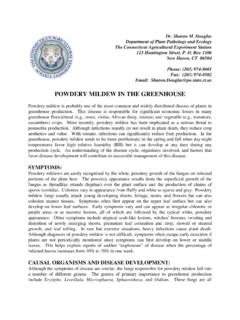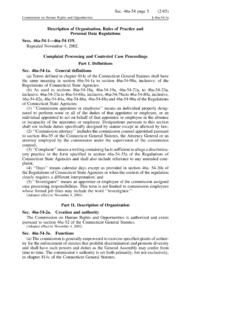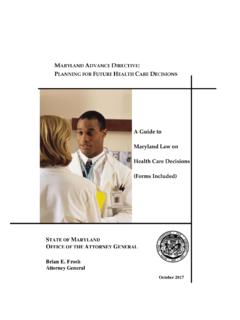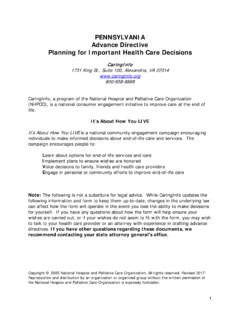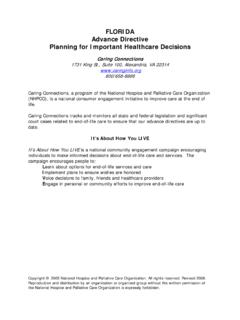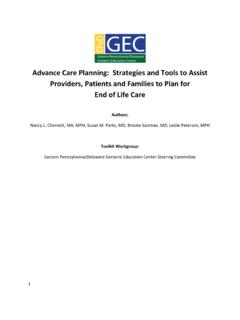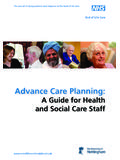Transcription of Planning for Future Health Care Decisions - Connecticut
1 Connecticut advance Directives: Planning for Future Health care Decisions Your Rights to Make Health care Decisions and Frequently Asked Questions A Summary of Connecticut Law Directions for Completing the Consolidated Health care Instructions and advance Directives Document Consolidated Health care Instructions and advance Directives Document including all of the advance Directives Appointment of A Health care Representative, Living Will and Health care Instructions, Appointment of A Conservator, and Organ Donation in one form. Connecticut DEPARTMENT OF SOCIAL SERVICES Bureau of Aging, Community and Social Work Services Aging Services Division [State Unit on Aging] 25 Sigourney Street, Hartford, CT 06106 Pub. # 06-14 Planning For Future Health care Decisions In Connecticut : Your Health care Planning Packet Please find enclosed: 1. Your Rights to Make Health care Decisions and Frequently Asked Questions prepared, in large part, by the Office of the Attorney General for the Connecticut Department of Social Services (FAQs pages 1 7); 2.
2 Directions for Completing the Consolidated Health care Instructions and advance Directives Document (Directions pages 1 2); and the 3. Consolidated Health care Instructions and advance Directives Document including all of the advance directives (appointment of Health care representative, living will, appointment of a conservator of the persons and organ donation) in one form (Document pages 1 5, 6). Important Notes: The Consolidated Health care Instructions and advance Directives Document is a legal document and gives broad legal powers to persons designated by you. If there are any portions of this Planning Packet that you do not understand or which may confuse you, consult an attorney. You may wish to contact your own attorney, or contact the Legal Services Developer at the Aging Services Division, 1-860-424-5244 or through 1-800-443-9946, relative to questions regarding this form or for a list of legal assistance resources available for older persons in Connecticut .
3 Numerous resources (such as your doctor or faith advisor) are also available to assist you in making Decisions about end-of-life Health care issues including life sustaining measures (such as artificial hydration and nutrition, cardiopulmonary resuscitation, and do-not-resuscitate orders), palliative care , quality of life, and the impact of your religious beliefs and moral convictions. Some other resources include: National Hospice and Palliative care Organization Helpline 800-658-8898 ; ABA Commission on Law & Aging Consumer Tool Kit (202) 662-8690 Cuidano con Carnio, Compassionate care Helpline 877-658-8896 Su Familia: The National Hispanic Family Health Helpline 866-783-2645 ; CT Area Agencies on Aging CHOICES HelpLine 1-800-994-9422 This information is available in alternate format. Phone (800) 842-1508 or TDD/TTY (800) 842-4524. Frequently Asked Questions - 1 Your Rights to Make Health care Decisions and Frequently Asked Questions A Summary of Connecticut Law prepared, in large part, by the Office of the Attorney General for the CT Department of Social Services You have the right to make Health care Decisions about the medical care you receive.
4 If you do not want certain treatments, you have the right to tell your physician you do not want them and have your wishes followed. You also have the right to receive information from your physician to assist you in reaching a decision about what medical care is to be provided to you. There may, however, come a time when you are unable to actively participate in determining your treatment due to serious illness, injury or other disability. 1. Do I have the right to make Health care Decisions ? Yes. Adult patients in Connecticut have the right to determine what, if any, medical treatment they will receive. If you can understand the nature and consequences of the Health care Decisions that you are being asked to make, you may agree to treatment that may help you or you may refuse treatment even if the treatment might keep you alive longer. 2. Do I have the right to information needed to make a Health care decision? Yes. Physicians have the responsibility to provide patients with information that can help them to make a decision.
5 Your physician will explain: what treatments may help you; how each treatment may affect you, that is, how it can help you and what, if any, serious problems or side effects the treatment is likely to cause; what may happen if you decide not to receive treatment. Your physician may also recommend what, if any, treatment is medically appropriate, but the final decision is yours to make. All of this information is provided so you can exercise your right to decide your treatment wisely. 3. What is an advance directive ? An advance directive is a legal document through which you may provide your directions or express your preferences concerning your Health care and/or to appoint someone to act on your behalf. Physicians and others use them when you are unable to make or communicate your Decisions about your medical treatment. Frequently Asked Questions - 2 advance directives are prepared before any condition or circumstance occurs that causes you to be unable to actively make a decision about your Health care .
6 In Connecticut , advance directives include: the living will and Health care instructions the appointment of a Health care representative 4. Must I have an advance directive ? No. You do not have to make a living will or other type of advance directive to receive medical care or to be admitted to a hospital, nursing home or other Health care facility. No person can be denied medical care or admission based on whether they have signed a living will or other type of advance directive . If someone refuses to provide you medical care or admit you unless you sign a living will or other type of advance directive , contact the Department of Public Health in Hartford, Connecticut at 860-509-7400. 5. What is a living will ? A living will is a document that may state your wishes regarding any kind of Health care you may receive. Should you be in a terminal condition or permanently unconscious, the living will can also tell your physician whether you want "life support systems" to keep you alive or whether you do not want to receive such treatment, even if the result is your death.
7 A living will goes into effect only when you are unable to make or communicate your Decisions about your medical care . 6. What does terminal condition and permanently unconscious mean? A patient is in a "terminal condition" when the physician finds that the patient has a condition which is (1) incurable or irreversible and (2) will result in death within a relatively short time if life support systems are not provided. "Permanently unconscious" means a permanent coma or persistent vegetative state where the patient is not aware of himself or his surroundings and is unresponsive. 7. What is a life support system ? A "life support system" is a form of treatment that only delays the time of your death or maintains you in a state of permanent unconsciousness. Life support systems may, among other things, include: Frequently Asked Questions - 3 devices such as respirators and dialysis; cardiopulmonary resuscitation (CPR); food and fluids supplied by artificial means, such as feeding tubes and intravenous fluids.
8 It does not include: normal means of eating and drinking, such as eating with assistance of another person or through a straw; or medications that help manage pain. 8. Will I receive medication for pain if I have a living will? Yes. A living will does not affect the requirement that your doctor provide you with pain medication or care designed solely to maintain your physical comfort (for example, care designed to maintain your circulation or the Health of your skin and muscles). This type of care must be provided whenever appropriate. 9. What is a Health care representative ? A Health care representative is a person whom you authorize in writing to make any and all Health care Decisions on your behalf including the decision whether to withhold or withdraw life support systems. A Health care representative does not act unless you are unable to make or communicate your Decisions about your medical care . The Health care representative will make Decisions on your behalf based on your wishes, as stated in a living will or as otherwise known to your Health care representative.
9 In the event your wishes are not clear or a situation arises that you did not anticipate, your Health care representative would make a decision in your best interests, based upon what is known of your wishes. 10. What kind of treatment Decisions can be made by a Health care representative? A Health care representative can make any and all Health care Decisions for you, including the decision to accept or refuse any treatment, service or procedure used to diagnose or treat any physical or mental condition. The Health care representative can also make the decision to provide, withhold or withdraw life support systems. The Health care representative cannot make Decisions for certain specific treatments which by law have special requirements. Frequently Asked Questions - 4 11. How will my Health care representative know when to get involved in making Decisions for me? At any time after you appoint your Health care representative, your Health care representative can ask your attending physician to provide written notice if your physician finds that you are unable to make or communicate your Decisions about your medical care .
10 Even if your Health care representative does not do so, your Health care providers will usually seek out your Health care representative once they determine that you are unable to make or communicate your Decisions about your medical care . 12. What is a conservator of the person ? A "conservator of the person" is someone appointed by the Probate Court when the Court finds that a person is incapable of caring for himself/herself including the inability to make Decisions about his or her medical care . A person who is conserved by a court is known as a ward . The conservator of the person is responsible for making sure that the ward s Health and safety needs are taken care of and generally also has the power to give consent for the ward s medical care , treatment and services. If a conservator is later appointed for you, he or she must follow your Health care instructions, either as expressed in a living will or as otherwise known to your conservator, made while you were able to make and communicate Health care Decisions .





